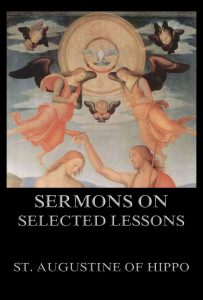Sermons On Selected Lessons Of The New Testament – St. Augustine of Hippo
The Sermons of St. Augustine, besides their other excellencies, furnish a beautiful picture of perhaps the deepest and most powerful mind of the Western Church adapting itself to the little ones of Christ. In them, he who has furnished the mould for all the most thoughtful minds for fourteen hundred years, is seen forming with loving tenderness the babes in Christ. Very touching is the child-like simplicity, with which he gradually leads them through what to them were difficulties, watching all the while whether he made himself clear to them, keeping up their attention, pleased at their understanding, dreading their approbation, and leading them off from himself to some practical result. Very touching the tenderness with which he at times reproves, the allowance which he makes for human infirmities and for those in secular life, if they will not make their infirmities their boast, or in allowed duties and indulgences forget God. But his very simplicity precludes the necessity of any preface. His Sermons explain themselves. They appear from a passage in the Commentary on the Psalms to have been often taken down in writing at the time by the more attentive sort of hearers (as were those of St. Chrysostom); Possidius states that this was done from the commencement of his presbyterate, and that “thence through the body of Africa, excellent doctrine and the most sweet savour of Christ was diffused and made manifest, the Church of God beyond seas, when it heard thereof, partaking of the joy.”
Sermons On Selected Lessons Of The New Testament.
ISBN: 9783849674076.
Available at amazon.com and other venues.
Biography of St. Augustine of Hippo
Augustine of Hippo (13 November 354 – 28 August 430) was an early Christian theologian and philosopher whose writings influenced the development of Western Christianity and Western philosophy. He was the bishop of Hippo Regius (within modern-day Annaba, Algeria), located in Numidia (Roman province of Africa). Augustine is viewed as one of the most important Church Fathers in Western Christianity for his writings in the Patristic Era. Among his most important works are The City of God and Confessions. According to his contemporary, Jerome, Augustine “established anew the ancient Faith.” In his early years, he was heavily influenced by Manichaeism and afterward by the neo-Platonism of Plotinus. After his baptism and conversion to Christianity in 386, Augustine developed his own approach to philosophy and theology, accommodating a variety of methods and perspectives. Believing that the grace of Christ was indispensable to human freedom, he helped formulate the doctrine of original sin and made seminal contributions to the development of just war theory. When the Western Roman Empire began to disintegrate, Augustine developed the concept of the Church as a spiritual City of God, distinct from the material Earthly City. His thoughts profoundly influenced the medieval worldview. The segment of the Church that adhered to the concept of the Trinity as defined by the Council of Nicaea and the Council of Constantinople closely identified with Augustine’s On the Trinity.
Augustine is recognized as a saint in the Catholic Church, the Eastern Christian Church, and the Anglican Communion and as a preeminent Doctor of the Church. He is also the patron of the Augustinians. His memorial is celebrated on 28 August, the day of his death. Augustine is the patron saint of brewers, printers, theologians, the alleviation of sore eyes, and a number of cities and dioceses. Many Protestants, especially Calvinists and Lutherans, consider him to be one of the theological fathers of the Protestant Reformation due to his teachings on salvation and divine grace. Lutherans, and Martin Luther in particular, have held Augustine in preeminence (after the Bible and St. Paul). Luther himself was a member of the Order of the Augustinian Eremites (1505-1521).
In the East, some of his teachings are disputed and have in the 20th century in particular come under attack by such theologians as John Romanides. But other theologians and figures of the Eastern Orthodox Church have shown significant appropriation of his writings, chiefly Georges Florovsky. The most controversial doctrine surrounding his name is the filioque, which has been rejected by the Orthodox Church. Other disputed teachings include his views on original sin, the doctrine of grace, and predestination. Nevertheless, though considered to be mistaken on some points, he is still considered a saint, and has even had influence on some Eastern Church Fathers, most notably Saint Gregory Palamas. In the Orthodox Church his feast day is celebrated on 28 August. Church scholar and historian Diarmaid MacCulloch writes “his impact on Western Christian thought can hardly be overstated; only his beloved example Paul of Tarsus, has been more influential, and Westerners have generally seen Paul through Augustine’s eyes.”
(The text of the last section was taken from a Wikipedia entry and is available under the the Creative Commons Attribution-ShareAlike License.)
Publisher’s Note: This book is printed and distributed by Createspace a DBA of On-Demand Publishing LLC and is typically not available anywhere else than in stores owned and operated by Amazon or Createspace.

